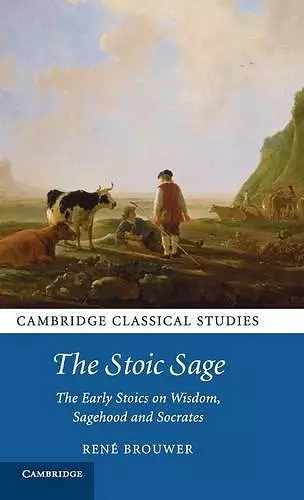The Stoic Sage
The Early Stoics on Wisdom, Sagehood and Socrates
Format:Hardback
Publisher:Cambridge University Press
Published:9th Jan '14
Currently unavailable, and unfortunately no date known when it will be back
This hardback is available in another edition too:
- Paperback£30.99(9781107641778)

The first ever book-length study of the influential Stoic concept of wisdom.
Offers a reconstruction of one of the cornerstones of Western thought, the Stoic notion of wisdom. It explains its pivotal role within Stoicism and its historical ties with Socrates. Essential reading for philosophers and classicists, and indeed for anyone interested in the Graeco-Roman classical tradition.After Plato and Aristotle, the Stoics, from the third century BCE onwards, developed the third great classical conception of wisdom. This book offers a reconstruction of this pivotal notion in Stoicism, starting out from the two extant Stoic definitions, 'knowledge of human and divine matters' and 'fitting expertise'. It focuses not only on the question of what they understood by wisdom, but also on how wisdom can be achieved, how difficult it is to become a sage, and how this difficulty can be explained. The answers to these questions are based on a fresh investigation of the evidence, with all central texts offered in the original Greek or Latin, as well as in translation. The Stoic Sage can thus also serve as a source book on Stoic wisdom, which should be invaluable to specialists and to anyone interested in one of the cornerstones of the Graeco-Roman classical tradition.
'This monograph by René Brouwer offers the best investigation to date of the (early) Stoic ideal of the sage and the Stoic conception of wisdom. It is an extremely solid and conscientious piece of work. The relevant sources, also ones that are lesser known, are given in the original Greek or Latin as well as in English translation, and interpreted with great care and precision, and appropriate caution. In doing so, Brouwer comprehensively considers the relevant scholarly literature, not just the more recent publications, and not just, as is common these days, those in English only. … The author's undisputed expertise makes one hope that he will further investigate this topic, fuel more discussion, and bring about more insights.' Maximilian Forschner, translated from Bryn Mawr Classical Review
'[This book] offers many insights, and its main conclusions point, suggestively and fruitfully, to useful directions for further research.' Jacob Klein, Notre Dame Philosophical Reviews
ISBN: 9781107024212
Dimensions: 218mm x 137mm x 20mm
Weight: 390g
242 pages